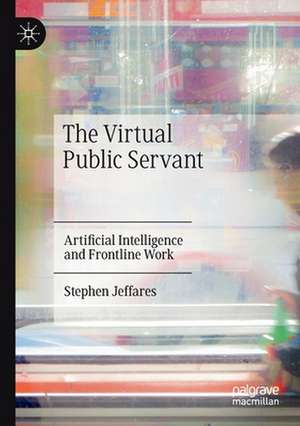The Virtual Public Servant: Artificial Intelligence and Frontline Work
Autor Stephen Jeffaresen Limba Engleză Paperback – 2 dec 2021
| Toate formatele și edițiile | Preț | Express |
|---|---|---|
| Paperback (1) | 694.37 lei 6-8 săpt. | |
| Springer International Publishing – 2 dec 2021 | 694.37 lei 6-8 săpt. | |
| Hardback (1) | 699.77 lei 6-8 săpt. | |
| Springer International Publishing – dec 2020 | 699.77 lei 6-8 săpt. |
Preț: 694.37 lei
Preț vechi: 816.90 lei
-15% Nou
Puncte Express: 1042
Preț estimativ în valută:
132.87€ • 144.78$ • 111.96£
132.87€ • 144.78$ • 111.96£
Carte tipărită la comandă
Livrare economică 24 aprilie-08 mai
Preluare comenzi: 021 569.72.76
Specificații
ISBN-13: 9783030540869
ISBN-10: 3030540863
Pagini: 274
Ilustrații: XV, 274 p. 20 illus., 7 illus. in color.
Dimensiuni: 148 x 210 mm
Greutate: 0.35 kg
Ediția:1st ed. 2021
Editura: Springer International Publishing
Colecția Palgrave Macmillan
Locul publicării:Cham, Switzerland
ISBN-10: 3030540863
Pagini: 274
Ilustrații: XV, 274 p. 20 illus., 7 illus. in color.
Dimensiuni: 148 x 210 mm
Greutate: 0.35 kg
Ediția:1st ed. 2021
Editura: Springer International Publishing
Colecția Palgrave Macmillan
Locul publicării:Cham, Switzerland
Cuprins
1. Artificial and Intelligence and Frontline Public Service.- 2. Control, Cost, Convenience and Connection, Four Problems for AI and Public Service.- 3. AI, Public Service and Research Methodology.- 4. Position Closed: The Disappearance and Datafication of Face-to-Face Public Service.- 5. Can I speak to a human? Automating Remote Contact in Frontline Public Service .- 6. The Non-Public Encounter: Self-Service and the Ephemoralisation of Public Service.- 7. The Management of Social Media in Frontline Public Service.- 8. Robots and Virtual Agents in Frontline Public Service.- 9. The Virtual Public Servant Fantasy.- 10. The Virtual Public Servant: Three Futures. A Q Study.
Notă biografică
Stephen Jeffares is Senior Lecturer, School of Government at the University of Birmingham, UK, where, as a director of doctoral research for social sciences and co-director of INLOGOV's Public Management and Leadership programme, he combines his interest in methods, technology and public service. His previous books are Hybrid Governance in European Cities (with Chris Skelcher and Helen Sullivan) and Interpreting Hashtag Politics.
Textul de pe ultima copertă
With recent advances and investment in artificial intelligence, are we on the verge of introducing virtual public servants? Governments around the world are rapidly deploying robots and virtual agents in healthcare, education, local government, social care, and criminal justice. These advances not only promise unprecedented levels of control and convenience at a reduced cost but also claim to connect, to empathise, and to build trust. This book documents how—after decades of designing out costly face to face transactions, investment in call centres, and incentivising citizens to self-service—the tech industry is promising to re-humanise our frontline public services. It breaks out of disciplinary silos and moves us on from the polarised hype vs. fear discussion on the future of work. It does so through in-depth Q-methodology interviews with a wide range of frontline public servants, from doctors to librarians, from social workers to school receptionists, and from police officers tocall handlers. The first of its kind, this book should be of interest across the social sciences and to anyone concerned with how recent measures to digitise and automate our services are paving the way for the development of full-blown AI in frontline work.
Stephen Jeffares is Senior Lecturer, School of Government at the University of Birmingham, UK, where, as a director of doctoral research for social sciences and co-director of INLOGOV's Public Management and Leadership programme, he combines his interest in methods, technology and public service. His previous books are Hybrid Governance in European Cities(with Chris Skelcher and Helen Sullivan) and Interpreting Hashtag Politics.
Caracteristici
Analyses how the rise of artificial intelligence can be applied to frontline government and public administration Provides interdisciplinary perspectives, featuring interviews with frontline public servants including doctors, social workers and police officers Considers how AI is re-shaping traditional ideas of face to face public encounters, and asks if this approach can both automate and 're-humanise' interactions between government and public
